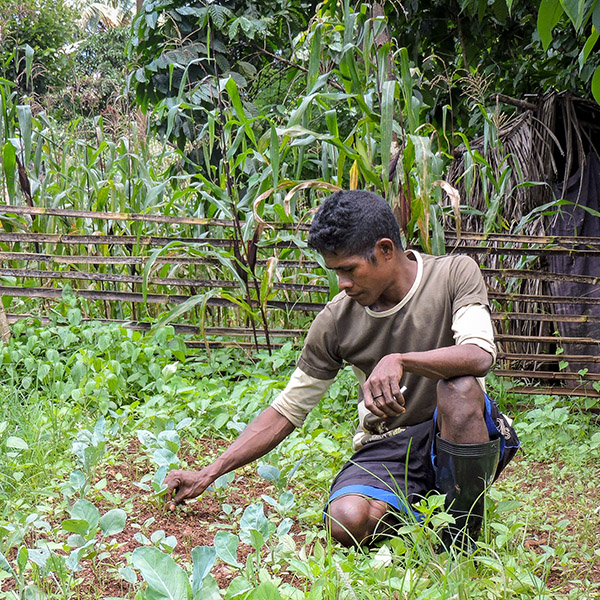Stories of Change

Paulinho weeds his group's garden.
A new partnership grows in Timor-Leste
Like most of his neighbors, Paulinho Martinez makes a living by farming and raising animals. Traditionally, he has raised his animals in the rainy season and focused on farming in the dry season. “In the past, the May to November dry season has been my time to hustle,” he says. “I would start selling the animals I raised during the rainy season, and I started planting the vegetables I knew would get a good price at market.”
Since it was the dry season, it wasn’t a time when the rain would keep Paulinho’s crops watered. “I had to haul the water to irrigate the vegetables from quite far away,” he says.
When the CWS Timor Zero Hunger program came to his community recently, Paulinho seized the opportunity to improve the way he farms. “I have learned so much from CWS staff about more modern farming techniques than I have used in the past, including why and how to plant a more diverse crop, and working with plants during the rainy season,” he says. As part of the program, Paulinho is now leading two Farmer Groups. He and his neighbors have teamed up to start communal gardens, experimenting with growing new types of vegetables in new ways.
“I am grateful for the experience to lead these groups; it is a big responsibility for me,” Paulinho says. “I am glad I get to share this information with others. I want to do well for my community; but, sometimes, when we face problems, it is hard for me not to get stressed about it.”
When we asked him what types of problems the group is facing, he took our team into one group’s communal garden. At the moment it’s lush with rainy season produce: tomatoes, bitter gourd, morning glory, corn and pumpkins. But over by the edge of the garden, Paulinho stops and points out the problem. It’s a row of half-dead vegetable seedlings. It was supposed to be a row of healthy Asian cabbage.
As Paulinho looks solemnly at the cabbage, he explains, “This was our first time planting Asian cabbage, and we are sad it didn’t grow. But we have figured out that it didn’t grow because of the land.” He grabs a stick and starts turning the soil around one seedling to show that it is now thick mud. For this vegetable to grow, “the land must hold moisture; but, in this plot, the water doesn’t absorb well. So, we have decided to wait until dry season to add compost to improve the soil and plant the remaining seeds and expect some success.”
As we chatted with him near the garden, Paulinho told our team that the Farmers Group didn’t plant all of the seeds that they received from CWS. There’s a real strategy here, and it reflects the fact that CWS is the first outside support many villages in this area have received. The group is cautious and manages their resources carefully. “We didn’t plant all of our new seeds because we wanted to test the new varieties along with some new farming practices,” he explains. The group doesn’t want to completely rely on outside help. Paulinho says, “We remembered that we know how to stand on our own. And, we thought it was important for us to save some seeds, which we did.” Now, in addition to planting the Asian cabbage seeds in better soil next year, the group wants to learn how to save seeds from the vegetables they already grow. Their plan will help them continue to get by, and maybe even better than that – with a little help from some friends.
